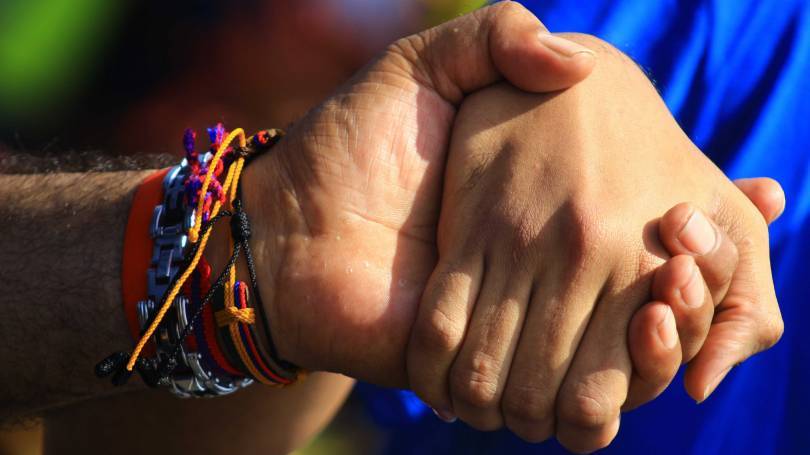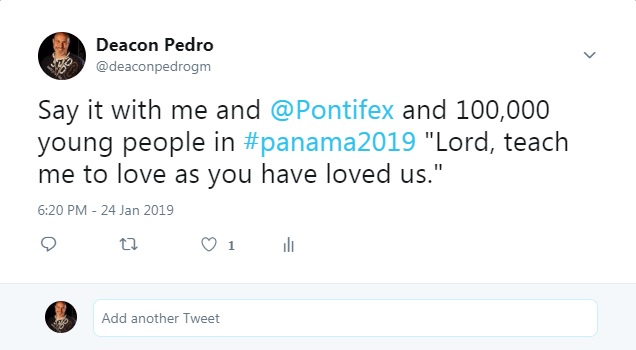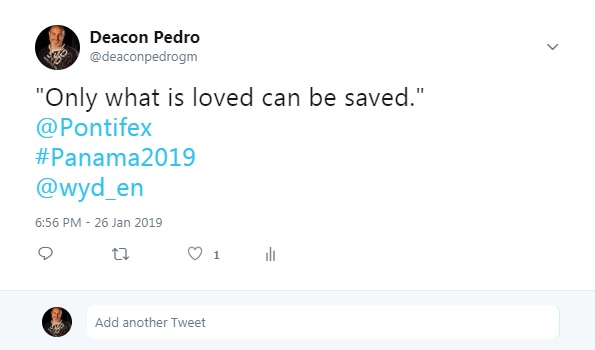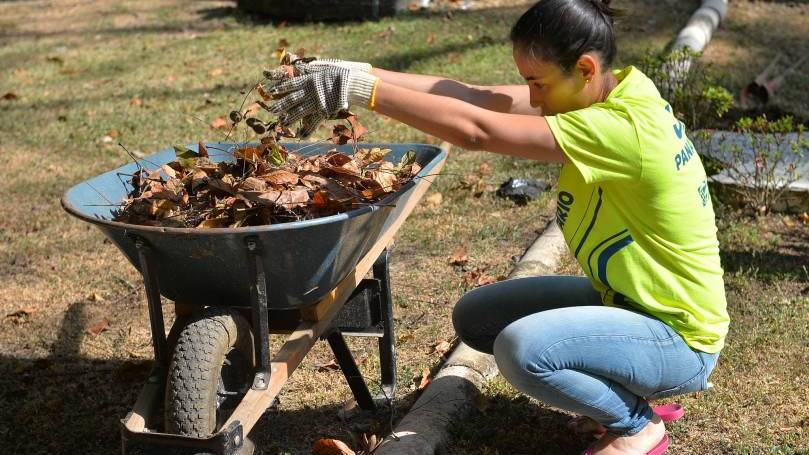SEARCH

 The Holy Father had just said that “wherever we may be and whatever we may do, we can always look up and say, ‘Lord, teach me to love as you have loved us’.” Then he asked everyone to repeat those words with him: “Lord, teach me to love as you have loved us”.
It may seem a bit obvious that anything we do that is inspired by Jesus Christ and our Christian faith has to do with love. Yet love is so misunderstood. At the same time, so many have never really experienced unconditional love – the kind of love that God has for us. This is why it’s important to remind ourselves that we are called to a much higher love: a love that always seeks the good of the other, a love that always puts others’ needs before our own.
The Holy Father had just said that “wherever we may be and whatever we may do, we can always look up and say, ‘Lord, teach me to love as you have loved us’.” Then he asked everyone to repeat those words with him: “Lord, teach me to love as you have loved us”.
It may seem a bit obvious that anything we do that is inspired by Jesus Christ and our Christian faith has to do with love. Yet love is so misunderstood. At the same time, so many have never really experienced unconditional love – the kind of love that God has for us. This is why it’s important to remind ourselves that we are called to a much higher love: a love that always seeks the good of the other, a love that always puts others’ needs before our own.
A love that has no time for complaining, but seeks to break the circle of useless, needless, cold and detached criticism, and faces head-on the complexity of life and of every situation. A love that initiates a process capable of providing ways and means for integration and transformation, healing and forgiveness: a path of salvation.This is the love that leads to conversion. But we don’t start with trying to convert; we start with showing that kind of love.
Like Mary, we want to be a Church that fosters a culture that welcomes, protects, promotes and integrates; that does not stigmatize, much less indulge in a senseless and irresponsible condemnation of every immigrant as a threat to society. From her we want to learn to stand beneath the cross, not with hearts tightly shut, but with hearts that can accompany, that feel tenderness and devotion, that show mercy and treat others with respect, sensitivity and understanding.Then he said in Spanish: Como María queremos aprender a “estar”. This was poorly translated as Like Mary we want to learn what it means to “stand”. I would have translated it as Like Mary we want to learn what it means “to be” or “to remain”. He then emphasized:
Lord, teach us “to be” (estar), at the foot of the cross, at the foot of every cross.The merciful love of the Father, which Mary lived, is a love that is. We are called to be in that love. To be present to others. To be with them. In a sense, that is a perfect way to summarize the vocation to which we are called.
 On Saturday night, at the Vigil, the pope reminded us that everyone deserves love:
On Saturday night, at the Vigil, the pope reminded us that everyone deserves love:
Embracing life is also seen in accepting things that are not perfect, pure or “distilled”, yet no less worthy of love. Is a disabled or frail person not worthy of love? Is a person who happens to be a foreigner, a person who made a mistake, a person ill or in prison, not worthy of love? We know what Jesus did: he embraced the leper, the blind man, the paralytic, the Pharisee and the sinner. He embraced the thief on the cross and even embraced and forgave those who crucified him. Why did he do this? Because only what is loved can be saved. Only what is embraced can be transformed.At that point, my nephew texted me saying: “What the pope is saying is amazing!” It was. It was a speech about love. At this address during the Vigil, Pope Francis used the word love twenty-two times! Still, I think that we fail to make the connection between love and vocation. It’s not as simple as “we are all called to love”. While that is true, it’s much more fundamental: We are called to love because we are called to be with God and God is love.

God chose not to reveal himself as an angel or in some spectacular way, but to give us a face that is fraternal and friendly, concrete and familiar. God is real because love is real; God is concrete because love is concrete.And just as love is concrete, so is finding our mission in life. A bit later, in telling us all that young people are the Church of today because for God there is no “tomorrow” or “in the meantime”, the pope said:
Not tomorrow but now, for wherever your treasure is, there will your heart also be (cf. Mt 6:21). Whatever you fall in love with, it will win over not only your imagination, it will affect everything. It will be what makes you get up in the morning, what keeps you going at times of fatigue, what will break open your hearts and fill you with wonder, joy and gratitude. Realize that you have a mission and fall in love; that will decide everything. We may possess everything, but if we lack the passion of love, we will have nothing. Let us allow the Lord to make us fall in love and drive us towards tomorrow.
Now you know how our hearts beat faster when we have a mission, not because someone told you this, but because you experienced it for yourselves. You experienced in your own life that “no one has greater love than this, to lay down one’s life for one’s friends.Indeed, love is our mission; love is our vocation, and love is how we find our vocation. Come back next week so we can look at the third lesson: Belong.
 Every week, Deacon Pedro takes a particular topic apart, not so much to explore or explain the subject to its fullness, but rather to provide insights that will deepen our understanding of the subject. And don’t worry, at the end of the day he always puts the pieces back together. There are no limits to deaconstructing: Write to him and ask any questions about the faith or Church teaching: [email protected]
Every week, Deacon Pedro takes a particular topic apart, not so much to explore or explain the subject to its fullness, but rather to provide insights that will deepen our understanding of the subject. And don’t worry, at the end of the day he always puts the pieces back together. There are no limits to deaconstructing: Write to him and ask any questions about the faith or Church teaching: [email protected]